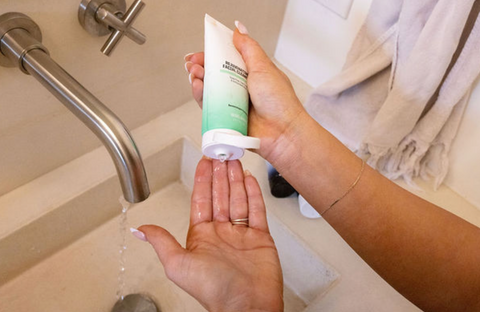Clear, radiant skin is a desire shared by many, regardless of age or gender. While there's no magic potion for achieving flawless, acne-free skin overnight, there are evidence-backed strategies and habits that can significantly improve skin health and appearance. From skincare routines to dietary adjustments, incorporating these tips into your lifestyle can help you achieve the glowing complexion you desire.
What Causes Acne?
Acne is a common skin condition that occurs when hair follicles become clogged with oil and dead skin cells. Several factors can contribute to the development of acne:
- Excess Oil Production: The sebaceous glands in the skin produce an oily substance called sebum. Excess sebum production can lead to clogged pores, providing an ideal environment for acne-causing bacteria to thrive.
- Dead Skin Cells: Skin cells shed continuously, but sometimes they don't shed properly and can accumulate in the pores, mixing with excess oil and causing blockages.
- Bacteria: Propionibacterium acnes (P. acnes) is a type of bacteria that lives on the skin and is typically harmless. However, when trapped in clogged pores, it can multiply rapidly, leading to inflammation and acne breakouts.
- Hormonal Changes: Fluctuations in hormone levels, particularly during puberty, menstruation, pregnancy, and menopause, can stimulate the sebaceous glands to produce more oil, increasing the likelihood of acne development.
- Genetics: Acne can run in families, suggesting a genetic predisposition to the condition. If one or both parents had acne, their children are more likely to experience it as well.
- Dietary Factors: While the link between diet and acne is still debated, some studies suggest that certain foods high in refined carbohydrates and dairy products may exacerbate acne in susceptible individuals.
- Stress: Chronic stress can trigger the release of hormones such as cortisol, which may stimulate oil production and inflammation in the skin, contributing to acne flare-ups.
- Certain Medications: Some medications, including corticosteroids, hormonal contraceptives, and drugs containing lithium or iodides, can worsen acne as a side effect.
- Cosmetics and Skincare Products: Certain cosmetics and skincare products containing comedogenic ingredients can clog pores and contribute to acne formation, especially if used excessively or incorrectly.
Understanding the underlying causes of acne can help individuals take preventive measures and adopt effective treatment strategies to manage and minimize breakouts. It's also important to consult with a dermatologist for personalized recommendations based on the severity and underlying factors contributing to acne.

9 Simple Ways To Achieve Clear Skin
- Stay Hydrated: One of the simplest yet most crucial factors in achieving clear skin is staying hydrated. Water helps flush toxins from your body, keeping your skin cells plump and hydrated. Aim to drink at least eight glasses of water a day to maintain optimal hydration levels. Additionally, consider incorporating hydrating foods such as cucumbers, watermelon, and oranges into your diet.
- Follow a Consistent Skincare Routine: Consistency is key when it comes to skincare. Establish a daily routine that includes cleansing, toning, moisturizing, and applying sunscreen. Choose products that are suitable for your skin type and free from harsh chemicals that can irritate the skin. Consistently following this routine will help keep your skin clean, balanced, and protected from environmental damage.
- Cleanse Your Skin Properly: Proper cleansing is essential for removing dirt, oil, and impurities that can clog pores and lead to breakouts. Use a gentle cleanser that effectively removes debris without stripping your skin of its natural oils. Avoid over-washing, as this can disrupt the skin's moisture barrier and lead to irritation. Opt for cleansing twice a day, in the morning and evening, to keep your skin clean and refreshed.
- Exfoliate Regularly: Exfoliation is the process of removing dead skin cells from the surface of the skin, revealing smoother, brighter skin underneath. Incorporating exfoliation into your skincare routine 1-3 times per week can help prevent clogged pores, reduce the appearance of fine lines and wrinkles, and promote cell turnover. Choose a gentle exfoliant suitable for your skin type, such as a chemical exfoliant containing ingredients like alpha hydroxy acids (AHAs) or beta hydroxy acids (BHAs).
- Maintain a Healthy Diet: What you eat can have a significant impact on your skin's health and appearance. Aim to consume a balanced diet rich in fruits, vegetables, lean proteins, and healthy fats. Foods high in antioxidants, such as berries, leafy greens, and nuts, can help protect your skin from oxidative stress and inflammation. Limit your intake of processed foods, sugary snacks, and greasy foods, as these can contribute to acne and other skin issues.
- Get Sufficient Sleep: Quality sleep is essential for overall health and well-being, including skin health. During sleep, your body repairs and regenerates skin cells, helping to maintain a youthful complexion. Aim for 7-9 hours of uninterrupted sleep each night to allow your skin ample time to rejuvenate. Establish a relaxing bedtime routine and create a sleep-friendly environment by keeping your bedroom cool, dark, and quiet.
- Manage Stress: Chronic stress can wreak havoc on your skin, leading to breakouts, inflammation, and premature aging. Incorporate stress-reducing practices such as mindfulness meditation, deep breathing exercises, or yoga into your daily routine to help manage stress levels. Engaging in activities you enjoy, spending time outdoors, and connecting with loved ones can also help alleviate stress and promote overall well-being.
- Avoid Smoking and Limit Alcohol Intake: Smoking not only damages your internal organs but also has detrimental effects on your skin. Cigarette smoke contains toxins that can constrict blood vessels, reduce oxygen flow to the skin, and accelerate the aging process. Additionally, excessive alcohol consumption can dehydrate the skin and weaken its protective barrier, leading to dullness and dehydration. Limiting alcohol intake and avoiding smoking altogether can help improve skin health and appearance.
- Use Non-Comedogenic Products: When choosing skincare and makeup products, opt for non-comedogenic formulas that won't clog pores or exacerbate acne. Look for products labeled "non-comedogenic" or "oil-free" to ensure they won't contribute to breakouts. Additionally, avoid heavy, greasy products that can suffocate the skin and lead to congestion. Instead, choose lightweight, breathable formulas that allow your skin to breathe and function optimally.
Final Reflections: Start Your Journey to Clearer Skin
Embarking on the journey to achieve clear, radiant skin requires dedication, consistency, and patience. By integrating these evidence-backed tips into your daily routine, you can nourish your skin from the inside out, supporting its health and appearance. Remember the importance of staying hydrated, maintaining a regular skincare regimen, and incorporating gentle exfoliation. Prioritize healthy habits such as balanced nutrition, adequate sleep, and stress management to further enhance your skin's vitality. With perseverance and commitment, you can attain the clear, glowing complexion you've always desired.









Leave a comment
This site is protected by hCaptcha and the hCaptcha Privacy Policy and Terms of Service apply.